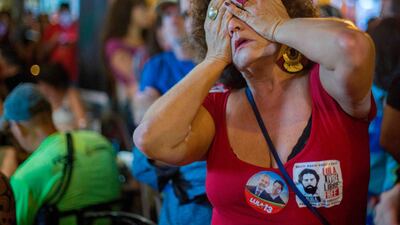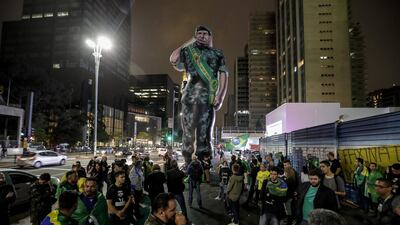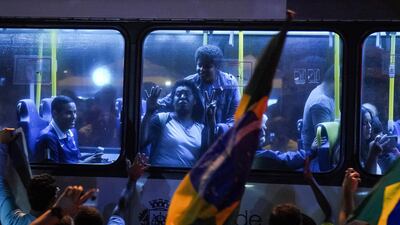Polarising far-right politician Jair Bolsonaro looked to be the big winner of a first-round presidential election in Brazil on Sunday – but a final victory in a run-off to be held in three weeks is far from assured.
The 63-year-old former paratrooper, who has vowed a tough crackdown on record-levels of crime, came within spitting distance of winning the presidency outright on Sunday.
He picked up 47 percent of votes, against 28 percent for his nearest rival, left-wing candidate Fernando Haddad, electoral authorities said after counting ballots from 93 percent of polling stations.
Had he pocketed more than 50 percent, he would automatically have become the president-elect.
_______________
Read more:
Brazil: A look at five top contenders as country votes amid anger at ruling class
Brazilian women rally in force against presidential frontrunner Jair Bolsonaro
How Brazil’s National Museum fire became a battleground of a new culture war
_______________
But he faced fierce resistance from a big part of the 147-million strong electorate put off by his denigrating comments against women, gays and the poor, and his unabashed nostalgia for the brutal military dictatorship that ruled Brazil between 1964 and 1985.
Now the pair – the two top candidates from a field of 13 on Sunday – will have to battle it out on October 28.
Surveys suggest Mr Bolsonaro currently has a very slight edge for that run-off but the outcome is too close to call as Mr Haddad will likely now pick up substantial support from the other beaten candidates.
Voting Sunday revealed the deep divisions generated by Mr Bolsonaro and Mr Haddad.
Some voters – particularly women – wore 'Not Him' slogans to polling stations, declaring their fierce opposition to Mr Bolsonaro.
But supporters, such as 53-year-old lawyer Roseli Milhomem in Brasilia, said they backed him because "Brazil wants change."
“We’ve had enough of corruption. Our country is wealthy, it can’t fall into the wrong hands,” she said.
Other Brazilians banged pots in protest when Mr Haddad, 55, voted in Sao Paulo, the mega-city he once ruled as mayor.
There is palpable disappointment and anger at the Workers Party, blamed for being at the helm when Brazil plunged into its worst-ever recession, from which it is still struggling to recover.
But a Haddad voter, Jose Dias, said it would be a "catastrophe" if Mr Bolsonaro triumphed.
“A lot of young people are voting for him. They don’t know what it was like under the dictatorship,” he said.
Better-off Brazilians have rallied to Mr Bolsonaro's pledge to crush crime that includes more than 62,000 murders each year, nearly as many rapes and frequent robberies.
Mr Bolsonaro wants to boost police forces and relax gun laws for "good" citizens.
Many voters also like his promises to tackle corruption and cut climbing public debt through privatisations, as well as the devout Catholic’s family-first stance.
But poorer Brazilians, who benefited most from the heyday under the Workers Party's iconic former president Luiz Inacio Lula da Silva between 2003 and 2010, want a return to good times and hope Mr Haddad can deliver.
The result is a very split electorate. Whoever ultimately wins will grapple with deep-rooted rejection and a large bloc of ideological hostility.
Despite sitting in congress for nearly three decades, Mr Bolsonaro casts himself as a political outsider in the mould of America's Donald Trump or the Philippines' Rodrigo Duterte: tough talking, brash, promising a root-and-branch overhaul to an electorate weary of traditional parties spouting empty promises.
"We can't always vote for the same candidates, the same parties. Overall change is needed," a 58-year-old retiree, Rubens Dantas de Oliveira, said as he voted.
In Rio de Janeiro, Clara Gentil turned out to vote in Copacabana, wearing a T-shirt emblazoned with the message "Not him."
“Brazilians were manipulated to vote out of hate. So this election is more important than others. Today, there is recession, hunger, people living in the streets, unemployed,” she said.
The outgoing centre-right president, Michel Temer – who took over after Lula's chosen successor Dilma Rousseff was impeached and ousted in 2016 for financial wrongdoing – was not standing for re-election.
He will leave office at the end of the year as a deeply unpopular figure in a country with 13 million unemployed, climbing public debt and inflation, and record violence.
The result puts the seven-time congressman on track for victory in the decisive, second-round vote on October 28.
Mr Bolsonaro’s domination was so overwhelming that it briefly appeared that he might capture enough votes to forgo the need for a runoff round – something that hasn’t happened for 20 years.
With such a wide margin of victory, the race is Mr Bolsonaro’s to lose. In every election that went to a second round since Brazil’s return to democracy more than three decades ago, the winner led in the first round.
Still, in what has already been a bitter and violent contest for the presidency, the next few weeks promise to unleash even greater hostility. In polls conducted before the election, both candidates had rejection ratings of more than 40 per cent. With only two candidates left in the race, their diametrically opposed views on how to run the country will come under much closer scrutiny.
“It’ll be three weeks of a dangerous and highly polarised scenario,” said Maurcio Santoro, a political scientist at the State University of Rio de Janeiro. “The level of conflict will be very high,” he said, adding that both have to overcome very high rejection rates to win.
Financial markets have see-sawed, tracking the ups-and-downs of the two candidates. Investors rallied behind Mr Bolsonaro not so much because they trust he will be able implement the best economic policies, but because he is the most viable candidate to prevent the return of Mr Haddad’s Workers’ Party and its interventionist economic policies.
"Bolsonaro is going to the runoff with very strong momentum," said Alberto Ramos, head of Latin America Economic Research at Goldman Sachs in New York. "The main challenge for him now is not to commit any major campaign mistake."










